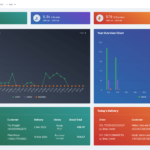
SEO Extensions for Chrome: The Ultimate Guide
As an SEO professional, managing data across various pages and URLs is something I do daily. Having the right toolset of SEO extensions can make this task significantly easier and help me assimilate information faster. From Chrome to Firefox, and even Brave, I’ve tested various browsers to see which is the best choice for SEO tasks. While Firefox and Orion offer decent options, I’ve found that a Chromium-based browser, like Brave, remains my default for accessing a wide range of SEO tools. These extensions work seamlessly on Chromium browsers, making them the go-to for professionals in the field.
SEO tasks can be time-consuming and overwhelming, but Google Chrome extensions have made it significantly easier to manage. These extensions streamline your workflow, boost efficiency, and improve your SEO game. If you’re an SEO professional or a content creator looking for ways to optimize your workflow, these tools are a must-have. With these SEO extensions, you can handle everything from keyword research to backlink analysis with just a few clicks. Let’s explore some of the most effective SEO extensions you can add to your Chrome browser.
1. SEO’s Magic Opener
SEO’s Magic Opener is a fantastic extension for those who frequently use Google Search Console (GSC). It allows you to instantly open the performance report of a URL you’re visiting with just a couple of clicks. Instead of manually navigating to GSC, filtering the data, and waiting for it to load, this extension streamlines the process and helps you save time. It’s particularly useful for SEO professionals who work with multiple URLs and need quick access to performance metrics. By simply selecting the right property type, you can view data for domain properties without any additional hassle.
2. SEO Meta in 1-Click
SEO Meta in 1-Click is a must-have for anyone dealing with metadata. This extension allows you to retrieve vital SEO-related information for any page you visit, such as URL title, description, OG tags, Twitter card meta tags, canonical URL, and X-Robots-Tag. It simplifies the process of checking a page’s metadata and other on-page elements. I find this especially useful when I’m doing a quick SEO audit or need to check a page’s SEO health during content creation. It also displays information on images, headings, and other key SEO factors.
3. Detailed SEO
Detailed SEO is a comprehensive extension that provides more in-depth data than other similar tools. It helps you analyze canonical URLs, robots-meta tags, schemas, and web vitals. This extension is particularly helpful when you need detailed insight into the technical aspects of a webpage, such as checking the X-Robots-Tag or reviewing the metadata for performance issues. It’s an excellent tool for tracking SEO elements that may be missed by simpler extensions. Whether you’re working with internal or external links, Detailed SEO helps you ensure that your pages are properly structured for search engines.
4. SEO Pro
SEO Pro is a popular extension in the SEO community, known for its advanced features. This tool allows you to analyze metadata, redirects, and web vitals data with ease. For example, it can help you identify redirect chains or analyze performance data directly from the browser. It’s perfect for professionals who want to get a comprehensive overview of a page’s SEO health without opening multiple tools or websites. The extension also offers quick insights into headings and content structure, making it an all-in-one SEO tool that streamlines the auditing process.
5. NoFollow
The NoFollow Chrome extension is designed to help you easily identify NoFollow links on a webpage. By default, it highlights these links in red and follow links in green, which makes it simple to spot potential SEO issues. This extension is incredibly useful when you want to audit link health and make sure your links are properly tagged. If you’re analyzing a page for link management, this tool is a great way to quickly spot anchor text issues and identify links that need attention.
6. Link Grabber
Link Grabber is a simple yet powerful extension that allows you to grab all the links (both internal and external) on a page in a matter of seconds. It’s especially helpful when you want to find duplicate links, broken links, or search for a specific link on the page. For SEO professionals, this tool can save valuable time during site audits. With Link Grabber, you can instantly extract hrefs, identify problematic links, and take action to fix them.
7. Check My Links
Check My Links is a page link checker that is unparalleled in terms of reliability. It scans every link on the page and checks its status, showing if a link is healthy or if it’s returning 4xx errors or a redirect. This extension is crucial when performing link audits or ensuring that your website has no broken links that could negatively impact SEO. As someone who frequently works with large websites, I find Check My Links indispensable when it comes to identifying issues with external and internal links.
8. Redirect Path
The Redirect Path extension is perfect for troubleshooting URL redirects and understanding the HTTP status codes associated with those redirects. It helps you trace the entire redirect chain of a URL to uncover any issues, such as unnecessary redirects that might slow down page loading times. Additionally, it displays HTTP headers, which can help you analyze server response configurations like caching and content type. This tool is a must-have for anyone looking to improve their SEO performance and ensure that redirects are properly set up.
9. HTTP Headers
HTTP Headers is a simple yet effective extension for analyzing HTTP response headers. This tool shows you the HTTP request and response for the current webpage, allowing you to check for things like cache settings, server type, and other technical aspects that influence SEO performance. It’s an essential tool for anyone working with technical SEO and needs to ensure that their server-side configurations are optimized for search engines.
10. Robots Exclusion Checker
Robots Exclusion Checker is a crucial tool for anyone managing website indexability. It checks whether a page can be indexed by search engines, helping you ensure that your site is properly optimized for SEO. This extension is ideal for analyzing robots.txt files and checking if any pages are unintentionally blocked from being crawled by search engines. By reviewing URL indexability, I use this tool regularly to make sure my pages are accessible and can be indexed for better visibility in the SERP.
11. Ahrefs, Majestic, SEOquake, Moz
These are four powerful backlink checker extensions that every SEO professional should be familiar with. Ahrefs, Majestic, SEOquake, and Moz each offer valuable insights into backlinks, domain authority, and SEO metrics. Whether you’re tracking referring domains, analyzing page authority, or checking the backlink profile of a competitor, these tools provide essential data to help with SEO strategy. I personally prefer using Ahrefs and SEOquake for tracking backlinks because they also integrate with Google Search Console and other SEO tools, making the analysis process faster and more efficient.
12. HeadingsMap
HeadingsMap is an essential extension for analyzing the heading structure of any webpage. This tool helps you easily visualize the HTML5 tags on the page, ensuring that the structure is logical and properly formatted for both users and search engines. With HeadingsMap, I can instantly see where headings might be missing, which is crucial for SEO as proper heading hierarchy is important for content organization and user experience.
13. Web Vitals
Web Vitals is an official Chrome extension developed by Google to measure page performance and provide insights into key user experience metrics. It helps you understand how Cumulative Layout Shifts (CLS) affect your page’s usability, and it provides detailed performance data for every page you open. As SEO is increasingly tied to user experience, using Web Vitals has become a non-negotiable tool for anyone looking to improve their site’s ranking and usability.
14. CLS Visualizer
CLS Visualizer helps you find the elements on your page that cause Cumulative Layout Shifts (CLS). This extension highlights those elements in red, allowing you to take action to fix layout issues that could affect your SEO performance. Since Google considers CLS a ranking factor, this tool is particularly useful for improving page speed and ensuring a seamless user experience.
15. Performance-Analyser
The Performance-Analyser extension gives you a detailed analysis of a page’s performance. It shows you critical data like the number of images, their size, requests to third parties, and a waterfall chart for page load time. This is essential for anyone looking to improve page load speed, which directly impacts SEO. With this tool, you can pinpoint exactly where you need to optimize your site for better performance.
16. Keyword Surfer & Keyword Everywhere
Keyword Surfer and Keyword Everywhere are both excellent for keyword research. Keyword Surfer provides real-time data on search volume, CPC, and related keywords right within the SERP. Keyword Everywhere also offers valuable insights into search trends, showing related keywords and long-tail keywords that can help enhance your SEO strategy. Both tools make it easy to build a keyword list and stay on top of keyword performance in your niche.
17. Wappalyzer, React Developer Tools, Vue Devtools, Angular Devtools
These extensions are useful for uncovering website technologies used by different websites. Wappalyzer helps you discover which tech stack is being used (like JavaScript frameworks), while React Developer Tools, Vue Devtools, and Angular Devtools provide deep insights into the JS frameworks running on a site. These tools are invaluable for SEO professionals who need to understand the technical aspects of websites and ensure that they’re optimized for search engines.
18. Glimpse
Glimpse is a unique extension that enhances your Google Trends experience by adding a search volume axis to the trend chart. This allows you to easily visualize the popularity of different search terms and spot emerging trends early. If you’re tracking search volume over time, Glimpse is a great tool for identifying growing topics and optimizing your content strategy.
19. Hreflang Tag Checker
For websites targeting multiple languages or regions, Hreflang Tag Checker helps ensure that your hreflang tags are correctly implemented. These tags are crucial for telling search engines which language or country version of your page to show to users. This extension checks if the tags are properly set up and functioning, which is vital for international SEO.
20. AIPRM for ChatGPT
AIPRM for ChatGPT is a useful tool for generating SEO-friendly prompts to help you create content faster. Whether you’re writing an in-depth article or conducting keyword research, this extension offers predefined prompts to improve your productivity. It’s perfect for anyone using ChatGPT to assist with SEO content creation, as it streamlines the process and helps generate relevant, high-quality output.



